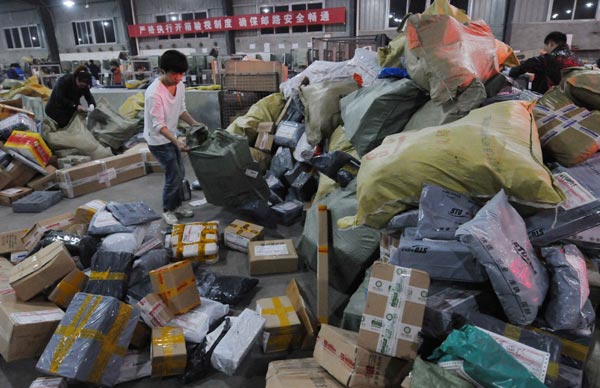Customer service 'leaves shoppers cold'
By Zheng Yangpeng and Du Xiaoying (China Daily) Updated: 2014-06-12 06:54|
 Workers at a delivery service company in Jiujiang, Jiangxi province, sort packages on the ground. A study by Deloitte Touche Tohmatsu Ltd found that up to 75 percent of Chinese customers are not satisfied with their customer experience through multiple channels. Hu Guolin / For China Daily |
New study finds retail companies don't deliver consistency, satisfaction
Technological advancement and Internet penetration have transformed how companies interact with customers. But although an increasing number of Chinese consumers and retail companies have developed multiple channels for engaging consumers, such as stores, the Internet and mobile apps, customers don't seem impressed.
 |
|
 |
A study by Deloitte Touche Tohmatsu Ltd found that up to 75 percent of Chinese customers are not satisfied with their customer experience through multiple channels. Various problems emerge in every sector when customers research, choose, buy and use products and seek after-sale service, and every glitch has the potential to ruin a company's reputation.
For example, a consumer may find online discount information doesn't match the prices being offered in brick-and-mortar stores. Product promotion brochures may promise a full refund if the goods are not satisfactory, but sales staff in stores might not know that.
Behind these glitches, Deloitte said, lies a lack of consistency and interconnectivity among different departments within a company. Product development teams and sales teams seldom communicate, and they have different ideas about the products.
Sales employees on the ground, meanwhile, know little about what the social media promotion department is doing.
Through customer surveys, focus groups, in-depth executive interviews and mystery shopping, Deloitte found that many companies in China only paid lip service to customer relations management and loyalty programs such as reward points and VIP cards.
"Many companies do not have a clear vision of why they are launching loyalty programs. They told us they do it just because other firms are doing it," said Joseph Fan, associate director of Deloitte China's consumer business consulting practice and a co-author of the study.
He stressed it is important to have a clear goal before launching a loyalty program. Is it to ratchet up cross-selling, attract potential customers or just improve service quality? Clear defining of objectives will help companies to target the right customers, collect the right data and design the right rewards.
It is also important to reinvent the organization to fully realize the "customer-centric" strategy, the study said. For example, why not try to create a customer experience team to coordinate the development team and sales team?
Robert Hah, another author of the study, said although modern technology enables most companies to collect customer data with ease, the problem is how to interpret the massive amount of information, sometimes scattered around different departments, and put it into practice.
- Mobile Asia Expo opens in Shanghai
- Dutch dairy companies eyeing growth in China
- China, Italy map out three-year cooperation plan
- Top 10 industries with most generous private employers
- Home purchase curbs being eased in more cities
- Nanjing 3D street painting sets world record
- Realtors gird for slumps in midyear net profit
- Xunlei to restart its IPO process in US

















